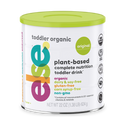Why Choose an Organic Baby Formula
Organic baby formula offers numerous benefits for your little one. Learn why choosing organic formula for your baby's feeding needs is a healthy and safe choice.
Published May 30, 2024

Choosing the best baby formula to meet your little one’s needs is a very important decision. Your baby’s first year of life is a period of rapid growth. Infant formula is designed to support this growth by providing adequate macronutrients (carbohydrates, protein, and fat) and micronutrients (vitamins and minerals) in the right quantities to meet your growing baby’s nutritional needs as they transition off human milk.
» Make the right choice and support your little one's growth by choosing this plant-based formula
Navigating Formula Options
However, it can often feel overwhelming with so many formula options on the market. Many of these options have hard-to-pronounce ingredients and syrups like high fructose corn syrup, soy, lactose, brown rice syrup, or undesirable oils like palm oil, soy oil, or vegetable oil. Choosing an organic infant formula can provide peace of mind, ensuring pure nutrition free of hormones, antibiotics, minimal pesticide residues, and no GMOs. Understanding what organic means and how organic baby formula is made can help you make the best choice for your baby.
» For a stress-free decision, read this complete guide to organic baby formula
What does organic mean?
Organic products are those produced without conventional pesticides or fertilizers and made with synthetic nutrients (i.e., man-made ingredients). By definition, an organic product does not contain any chemical pesticides, is not genetically modified in any way, nor does it generate any radiation during production like conventional products may.
Organic farming practices are designed to meet the following goals:
- Enhance soil and water quality
- Reduce pollution
- Provide safe, healthy livestock habitats
- Enable natural livestock behavior
- Promote a self-sustaining cycle of resources on a farm
To be certified organic, food must be produced on a farm that follows these strict standards, using only natural, organic pesticides or fertilizers. Organic products are also GMO—and hormone-free. Organic farms are inspected regularly to ensure the farmers are following all necessary rules and adhering to federal organic standards.
» Check out this GMO and hormone-free formula for toddlers
Organic Labeling Requirements
Products must meet strict federal standards in order to be labeled certified organic, which includes the following:
- Produced without excluded methods, (e.g., genetic engineering, ionizing radiation, or sewage sludge).
- Produced using only allowed substances. View the National List of Allowed and Prohibited Substances (National List).
- Overseen by a USDA National Organic Program-authorized certifying agent, following all USDA organic regulations.
Additional requirements for organic labeling include:
- Products sold, labeled, or represented as organic must have at least 95 percent certified organic content.
- Products sold, labeled, or represented as “made with” organic must have at least 70 percent certified organic content. The USDA organic seal may not be used on these products.
- Products containing less than 70 percent organic content may identify specific ingredients as organic in the ingredients list.
Conventional Formula
Cow's milk and goat's milk are two common bases for traditional powder formula. However, these milk varieties are not very similar to human milk. Cow's milk contains a much higher proportion of casein than whey protein, whereas human milk contains a greater proportion of whey protein than casein. Compared to human milk, these animal milks also do not contain the same essential fatty acids. Cow and goat milk formulas can, in some cases, still be labeled organic, but many contain additives like DHA, prebiotics, probiotics and corn syrup solids.
» Learn all the reasons why you should consider dairy-free formula
Organic vs. Conventional Baby Formula
While conventional powder formula also contains the essential nutrients necessary for your baby’s growth, it also may come with some unknowns that are worth noting when formula feeding.
Ingredient List
Conventional formulas typically contain a longer list of GMO ingredients, with many including high fructose corn syrup, whey protein, lactose, brown rice syrup or other sweeteners as the first ingredient, depending on the formula manufacturers. They also may contain more added colors, flavorings, and other non-organic formula ingredients that are still not fully understood in the research. Organic baby and toddler formula aims to emulate breast milk to provide optimal nutrients. Choosing organic baby formula brands that contain minimal ingredients can ensure your baby receives only the necessary nutrition for proper growth and development, without fillers or additives that pose no benefit to their health.
» Discover what’s in your baby’s bottle! Dive into our detailed baby formula ingredient guide
Nutritional Profile Comparison
There is some evidence that the nutritional profile of organic products may be superior to that of conventional. While this is still being investigated, there is surely a benefit to choosing organic over conventional formulas. Organic baby formula is a superior choice to conventional even if the nutritional profile is equivalent, as it contains added safety measures and quality organic ingredients.
» See the difference! Dive into the nutritional benefits of organic kids shakes
Hormones and Conventional Formulas
The biggest concerns regarding conventional formulas are the levels of hormones and antibiotics present that pose potential health risks. Hormone and antibiotic intake from daily consumption of conventional formula (i.e. cow's milk or cow's milk formula) may increase the risk of obesity and antibiotic resistance later in life, as well as increase the risk for allergies. On the contrary, organic baby formulas are hormone and antibiotic-free, since these are not allowed in organic foods. Thus, organic formula is typically synonymous with hypoallergenic formula. Choosing an organic product may help mitigate the potential risks of too many hormones or antibiotics.
» Read about the benefits of hormone and antibiotic-free vegan formula for babies
Why choose an organic baby formula?
Choosing an organic baby formula can provide assurance that you are meeting your little one’s nutritional needs while also minimizing their exposure to potentially undesirable ingredients. Usually, organic baby formulas contain minimal ingredients, no harmful pesticides, hormones, or antibiotics, and are free of heavy metals. Additionally, fewer ingredients means that organic baby formula may also be easier to digest. All of these benefits of organic baby formula mean you can rest easy that the product is the best you can give your baby. Else Vegan Infant Formula will be 100% organic, clean-label, dairy and soy-free. A clean-label formula only contains natural, familiar, and simple organic ingredients that are easy to recognize, understand, and pronounce. If you are unsure what type of formula is best for your little one- organic infant formula is a wonderful choice. Whenever you choose a baby formula, always read the label including the ingredient list to ensure you know exactly what is in the product.
» Discover the best formulas free from harmful ingredients
All about Breast Milk
Formula feeding is different from mother's milk, but the goal should always be to keep it as similar as possible. Breast milk provides all the nutrition that your baby needs. You should aim to find an organic baby formula with a similar nutritional value that contains a mix of protein, fats, vitamins etc. to support your baby’s healthy growth. Choose an organic infant formula that can provide the same benefits, rather than choosing a conventional formula or non organic formula.
Always consult with your pediatrician prior to starting your little one on an organic infant formula to assure your baby’s nutritional and health needs are properly addressed.









